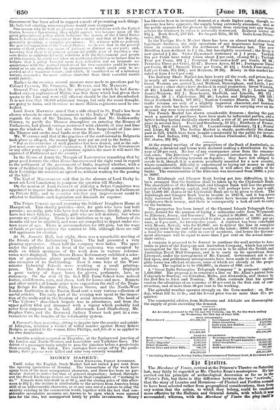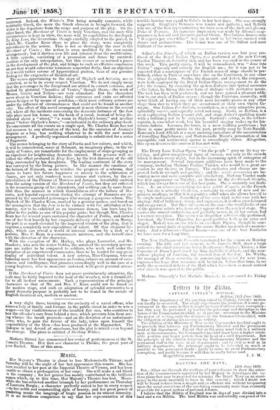SOr itOtstrts.
The Merchant of Venice, revived at the Princess's Theatre on Saturday last, may fairly be regarded as Mr. Charles Kean's masterpiece. He has carried out his principle of archteological decoration as far as in the Winter's Tale, but there is this difference between the two "revivals, that the story of Leontes and Hermione—of Florizel and Perdita seemed to have been selected rather from geographical considerations, than from any notion that the action, to which they belong, could be rendered more effective by the Hellenic and Oriental details, with which it was surrounded ; whereas, with the Merchant of Venice the play itself Is inpreed. Indeed, the Winter's Tale being actually romantic, while nominally Greek, the more the Greek element is brought forward, the wider is the departure from the scope and purpose of the play. On the other hand, the Merchant of Venice is truly Venetian, and the more this circumstance is kept in view, the more will its capabilities be developed. in Kinn Law, the decorations though carefully adapted to the period, in which Mr. Charles Kean chose to place the story, were completely subordinate to the action. This is not so thoroughly the case in the Merchant of Venice ; the action is even modified by the new scenic arrangement; • but it derives new life and interest from the modification. A little episode, consisting of a. procession and dance by carnival- maskers is the only interpolation, but this occurs at so natural a pause in the development of the plot, and brings to such an effective conclusion an act that would otherwise terminate somewhat flatly, that an objection to it would rather savour of hypercritical purism, than of any genuine feeling for the exigencies of theatrical art. The scenes appertaining to the story of Shyloek and Antonio are so contrived, as to be in every respect Venetian. We do not simply mean that the personages in the foreground are attired in correct costume, and backed by pictorial "beauties of Venice," though these,—the work of Messrs. Greive and Telbin—are very abundant. But the characters move about in Venetian fashion ; their entrances and exits are effected across bridges or by means of gondolas,—their most ordinary actions are under the influence of circumstances that could not be found in another city. The effect of this novel arrangement is most obvious in the second act, where all the incidents concerning the domestic fortunes of the Jew take place near his house, on the bank of a canal, instead of being dis- tributed about a "street," "a room in Sbylock's house," and another street "before Shylock's house,"—as indicated in the ordinary play-book. To concentrate all the events on a single spot, Mr. Charles Kean has not had recourse to any alteration of the text, for the omission of Jessica's disguise as a boy, has nothing whatever to do with the new scenic arrangement. A perfectly organized continuity is substituted for a series of fragments. . The scenes belonging to the story of Portia and, her suitors, and which, it will be remembered, occur at Belmont, an imaginary place, in the vi- cinity of Venice, are remarkable for the employment of stage-grouping as an expedient for heightening dramatic interest. Most persons will re- collect the effect produced in King Lear, by the first discovery of the old king, surrounded by his daughters. The leading sentiment of the story was conveyed by the living picture. In like manner the emotions of the heiress of Belmont, as she watches the progress of a scheme, that seems to leave her future happiness or misery to the arbitration of chance, are not only rendered more intense and various, by the re- introduction of the Princes of Morocco and Airagoia, invariably omitted from the acting version of the Merchant of Venice, but they are reflected in the numerous group of her attendants, and nothing can be more beau- tiful than the manner in which thankfulness after the failure of Mo- rocco, and hopeful expectation during the attempt of Bassani() are ex- pressed by the assembled-personages who occupy a gorgeous saloon. The ShYlock of Mr. Charles Kean, marked by a genuine pathos and based on the assumption that the Jew is to be endued with the attributes of hu- manity, not to be exhibited as au incarnate demon, has been long fa- miliar to the public as one of his popular parts; but though Mrs. Charles Keen has for several years sustained the character of Portia, and earned one of her best laurels by her exquisite delivery of the speech on Mercy, the part is so much elevated by the improved version of the play, that it requires a completely new expenditure of talent. Of that eloquent by- play, which can reveal, a world of internal emotion by a look or a gesture, Mrs. C. Kean is a consummate mistress, and she herself rises with the elevation of the character.
With the exception of Mr. Harley, who plays Launcelot, and Mr. Meadows, who acts the senior Gobbo, the actors of the secondary person- ages are rather to be compared to soldiers, who work well under the distipline of an experienced commander, than to be lauded for any great display of individual talent. A new actress, Miss Chapman, who on Saturday made her fiat appearance as Jessica, evinces an amount of care- fulness and intelligence, that promises exceedingly well in the case of a young beginner, who is moreover endowed with great personal attrac- tions.
If the Merchant of Venice does not prove preeminently attractive, the fault may be fairly imputed to the heat of the 'weather, now a formidable foe to all in-door amusements. Such a representation of the principal characters as that of Mr. and Mrs. C. Kean could not be found on the modern stage, and such an adaptation of splendid accessories to a grand dramatic purpose is probably not to be found in the annals of English- theatrical art, modern or ancient.
A very slight farce, turning on the audacity of a naval officer, who kisses a lady of family and fortune in the public street in order to win a wager—on the vindictiveness of the insulted fair one, who contrives to box the offender's ears from behind a tree, which prevents him from see- ing whence the insult proceeds—and on the devotion of an unfortunate lover, who, to gain the favour of the lady, takes upon himself the responsibility of the blots—has been produced at the Haymarket. The ogue is not devoid of smartness, but the plot is trivial even beyond the average. The piece is entitled A Striking Widow, Madame Ristori has commenced her series of performances at the St. james's Theatre. Her first new character is Phedre, the great part of poor Rachel. More of this anon.



























 Previous page
Previous page